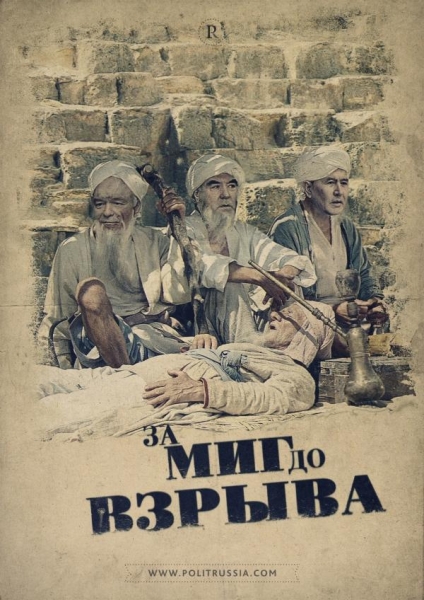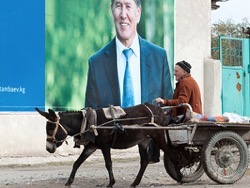
Which way of moving the Central Asian States? They threatened if the invasion of Islamist militants from Afghanistan and the creeping expansion of China? Policy Russia here? This was discussed at a meeting held in the Centre for theoretical and applied political science, Ranepa a scientific seminar. The report “Central Asia — the region’s ambitious and vulnerable regimes” were made by political analyst Arkady Dubnov. “Ribbon.ru” wrote down the main points of his speech.
Forward to feudalism
For a quarter century after the collapse of the Soviet Union most of the countries of Central Asia go back to the order that prevailed there before the Soviet authorities. The region is gradually sinking to the archaic, semi-feudal system of relations. This is especially true for Turkmenistan and Tajikistan. And in each country in formulating ways of development of the decisive role played by the personality of the President.
For example, the late Turkmen President Saparmurat Niyazov since the first years of independence in the best traditions of the medieval Emirate relied on local tribal elders and the sacralization of their absolute power. In Tajikistan, Emomali Rahmon at first relied on the Kulyab clan, then people from his native town of Danghara, and then only on her family. At the same time, the President of Kazakhstan Nursultan Nazarbayev decided to modernize the country, providing people with a measure of economic freedom. In Kyrgyzstan 15 years relative to democratic (especially in the face of neighbors) of Askar Akaev has laid a solid Foundation, allowing now somehow solve numerous internal problems.
In Russia and in the West it is accepted to consider the countries of Central Asia as something which is integral and identical, without any differences. So often perceive the region and in the European Union and the United States, and Japan. For example, in the EU used to see him only as a source of labour and raw materials and market for goods. But, unfortunately, Central Asia did not take place as a single region.
To this conclusion, in particular, come such famous Kyrgyz analysts, the ex-Minister of foreign Affairs of Kyrgyzstan Muratbek Imanaliev, political analyst Valentin Bogatyrev. They consider three main project that potentially could provide Central Asia with some integrity, but none of them had yet achieved this goal.
The first project is the Eurasian economic Union (EEU), in fact, mostly political, was established in January 2015 at the initiative of Russia and Kazakhstan. Most of the elites of the Central Asian States it is perceived as indirect attempts to recreate some semblance of the Soviet Union, which ultimately seemed to threaten their current political and financial advantages. Another problem of the EEU is its artificiality, in combination with the lack of long-term and sound economic strategy.
The second concept — “Economic zone of silk road” project, China — in the capitals of the Central Asian countries regarded as dangerous desire of Beijing to a creeping expansion in the region. Growing Chinese influence is perceived as a serious threat, even at the level of mentality.
Finally, the third is Islamic fundamentalism in its most General form, is actively spread in Central Asia in General population. This is because of the clarity and accessibility for the mass consciousness of the Islamist ideas that appeal to simple and clear conceptions of justice.
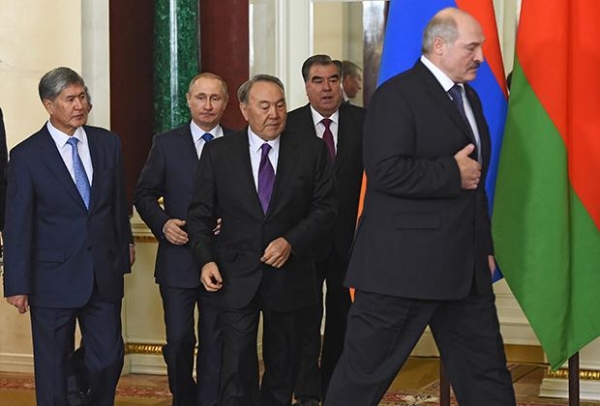
Session of Council of collective security Treaty Organization collective security and the meeting of the Supreme Eurasian economic Council at the highest level
Photo: Dmitry Dukhanin / Kommersant
Problems of Eurasian unity
With regard to the Organization of collective security Treaty (CSTO) as a military-political umbrella over the EEU, to date, this structure can not be claimed to solve conflicts like the one in Ukraine, war in Syria, the deadlock in relations between Russia and Turkey, and now escalation in Nagorno-Karabakh.
For example, recently voiced Belarus position on the escalation of the Karabakh conflict, where the Minsk actually sided with Baku, has led to diplomatic scandal with Armenia. Kazakhstan and Kyrgyzstan have distanced themselves from this, and Russia once again tried to mediate between the warring sides. If international mediators will fail to agree on entering in the zone of conflict peacekeeping force, it is unlikely that the CSTO will have to do with it.
You have to understand that the ruling regimes in Central Asia do not share the socio-political stability as a condition for their development and stability as a guarantee of their own stability. Leaders of some States tend to consider the collective rapid response forces of the CSTO as a last resource in case of a threat to his power. Especially this trend has accelerated now, against the background of constant talk about the threat of mass penetration into the region of Islamist militants from Afghanistan. Although there are serious doubts that even concentrated in Northern provinces of Afghanistan the armed forces of the Mujahideen seek to cross the Panj river.
The credibility of the Eurasian structures was severely disrupted by the events of two years ago in the Crimea and the Donbass. Coming from Moscow’s rhetoric about protecting the interests of Russian-speaking population outside of Russia have unsettled Kazakhstan. Astana then had to constantly juggle between the desire to maintain good relations with Moscow and a reflection of the political attacks of the Kazakh national-radicals.
As a result, speaking recently at the Washington Carnegie Center, President Nazarbayev made clear that Russia is only one of the vectors of Kazakhstan’s foreign policy, alongside the EU, China and countries of South-East Asia. The current Kazakh elite considers the EEU as an exclusively mid-term (if not short term) trend of the development of the country.
Most likely, in the near future the EEU will enter Tajikistan. In Dushanbe see how to successfully use membership in the Union of neighboring Kyrgyzstan, whose citizens may work in Russia as labor migrants on favourable terms — without patents and with simplified procedure of registration. For Tajikistan, where the total amount of remittances from citizens working abroad, compare well with the state budget, it is a very strong argument.
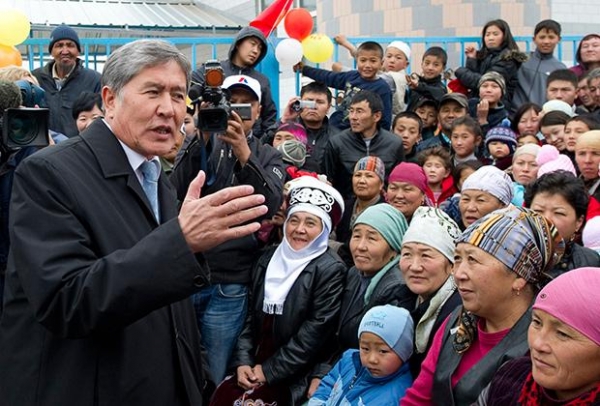
The candidate for President of Kyrgyzstan Almazbek Atambayev met with voters, October 2011
Photo: Vladimir Voronin / AP
Brotherly Kyrgyzstan
For Russia at the time was a very important accession of Kyrgyzstan to the EAEC because it clearly demonstrated the firmness of positions of Moscow in the region. Today Kyrgyzstan is our most reliable and loyal ally in Central Asia. The current President of the country Almazbek Atambayev, mindful of the mistakes of his predecessor, Kurmanbek Bakiyev, constantly deceiving and in the end who suffers for it, trying to pursue a reasonable and balanced policy, building relations with Russia.
But in the dialogue with the Russian leadership, he skillfully defends the interests of Kyrgyzstan — for example in the EEU country has entered, bargained sufficiently favorable terms. Atambayev skillfully balances between Russia and China, whose influence in Kyrgyzstan is growing. Suffice it to say that the country’s economy, according to him, even now at 30 percent dependent on Chinese loans, and the Kyrgyz President does not seek to increase this proportion, preferring to rely on borrowing from other sources, in particular from Russian.
Moscow almost every year supports the budget of Kyrgyzstan an interest-free loans. Recently, to support the Kyrgyz budget was sent to another grant in 30 million dollars. But this does not prevent the Bishkek pointedly Express displeasure when Russia breaks the performance of its obligations.
In January of this year, the Kyrgyz Parliament denounced the agreement on the construction of Russia for the Kambarata HPP and upper Naryn cascade of HPPs in a timely manner not funded by Moscow. On the other hand, recently “Gazprom” agreed to reduce to Kyrgyzstan gas price by 10%: from 165 dollars per thousand cubic meters to $ 150.
Bishkek in the dialogue with Moscow is also trying to avoid the pitfalls of historical grievances, is able to overshadow relations between the two countries. This summer will mark a century of the Turkestan revolt of 1916 against the colonial policy of the Russian Empire. In Kyrgyzstan, its brutal suppression by tsarist troops led to serious moral, economic and demographic consequences for local population.
The modern Kyrgyz radical nationalists have already started preparations to celebrate this sad anniversary under anti-Russian slogans, what really worries the authorities. Ceremonies in Kyrgyzstan is scheduled for August 2016, and in Bishkek, obviously, I hope that they will participate and the Russian leadership. If this happens, such a step would be, without exaggeration, the wise, is able to mitigate the perception of a very delicate topic.
Soft impotence
As to the possibility of Russia’s influence in the region through “soft power”, here lately we can only wonder. The potential use of such mechanisms in Central Asia is still very high, because the bulk of the population has received little during the years of independence and nostalgic of Soviet times. But we somehow treat this issue very casually.
For example, in Dushanbe, Tajikistan Russian-Tajik (Slavonic) University from the end of 2015 receives funding from Russia. As a result the University is able to become the perfect tool for applying our “soft power”, the whole educational process is now on the verge of collapse. If we fail to train Tajik students in their home countries, pretty quickly there will be other applicants — and it is not clear what science they will be taught there.
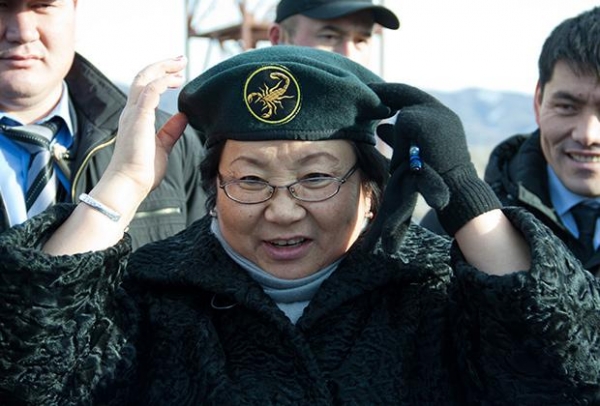
Roza Otunbaeva during a visit to military unit No. 52806
Photo: Dmitry Motinov / TASS
Another example: in Kyrgyzstan almost totally Russian-speaking and most friendly country in Central Asia — in recent years, a severe shortage of literature in the Russian language. Former President Roza Otunbaeva, which many in Moscow why-that is considered a Pro-Western politician, now head of the international public Foundation “Initiative of Roza Otunbayeva” and runs educational programmes. According to her, the country is desperately short of educational and methodological literature, necessary also courses of improvement of qualification of teachers of the Russian language.
At the same time, now in Kyrgyzstan is very noticeable “soft power” of China (e.g., the Confucius Institute). The country also has representatives of the American peace Corps and the British Council, Japanese and Korean volunteers.
However, as already mentioned, the vast majority of the population of Central Asia is still gravitate towards Russia, hence the need for our “soft power” in the region remains high. But how bad can things get for us in a few years, when finally leaving the older generation, in what direction will see the youth of today, is unclear.

